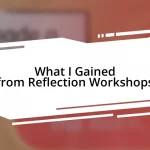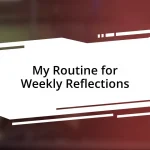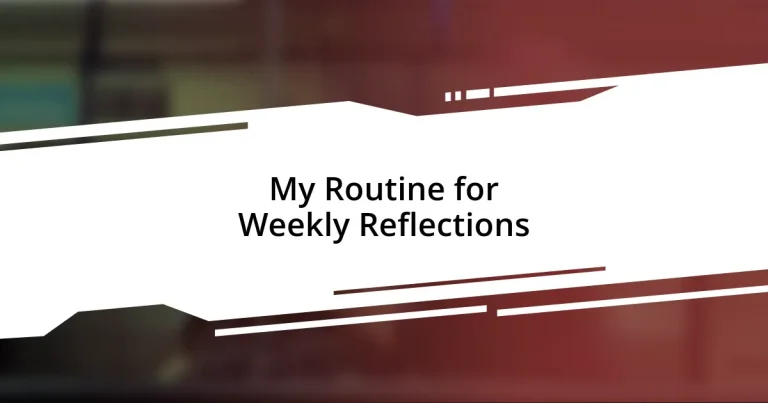Key takeaways:
- Weekly reflections enhance self-awareness, improve decision-making, and foster gratitude by allowing individuals to connect actions to feelings and appreciate small victories.
- Establishing a consistent routine and a personalized environment is crucial for effective reflection, transforming the practice into a meaningful ritual.
- Incorporating guiding questions and sharing reflections with others can deepen insights, leading to more comprehensive understanding and growth.
- Turning insights from reflections into actionable steps, such as creating a visual reminder or involving an accountability partner, empowers personal development and maintains motivation.
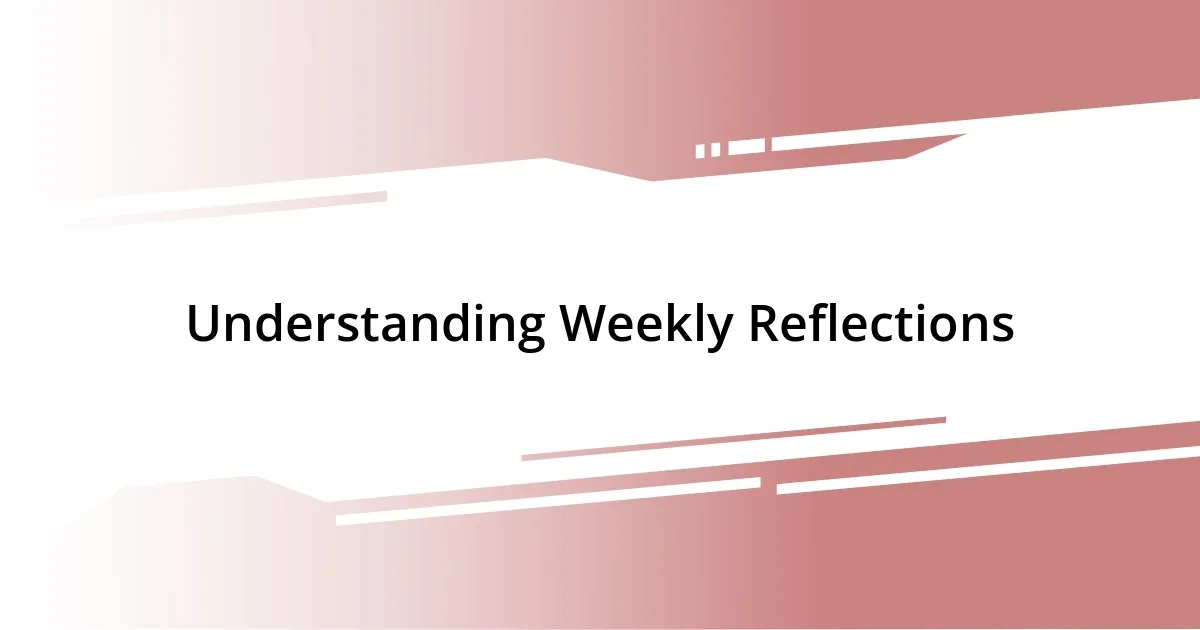
Understanding Weekly Reflections
Weekly reflections are a powerful tool for personal growth. I remember the first time I sat down to reflect on my week; it was like flipping open a well-worn book that I hadn’t read in years. I often wonder how many of us rush through life without pausing to appreciate our experiences. Taking that time not only fosters gratitude but also aids in understanding our emotions and decisions.
What strikes me most about weekly reflections is their ability to reveal patterns in our behavior. Have you ever finished a week feeling joyfully energized, only to find yourself drained and foggy the next? Personally, I’ve noticed that my mood swings often correlate with how I manage my time. Tracking these shifts over a few weeks enabled me to identify triggers and make more informed choices moving forward.
Moreover, reflections can stir a sense of purpose and intention. One Sunday evening, as I penned down my thoughts, I was astonished at how a simple act structured my week ahead. I realized that by setting clear intentions based on my reflections, I was more focused and driven. Isn’t it fascinating how just a few minutes of introspection can effectively set the pace for the days to come?
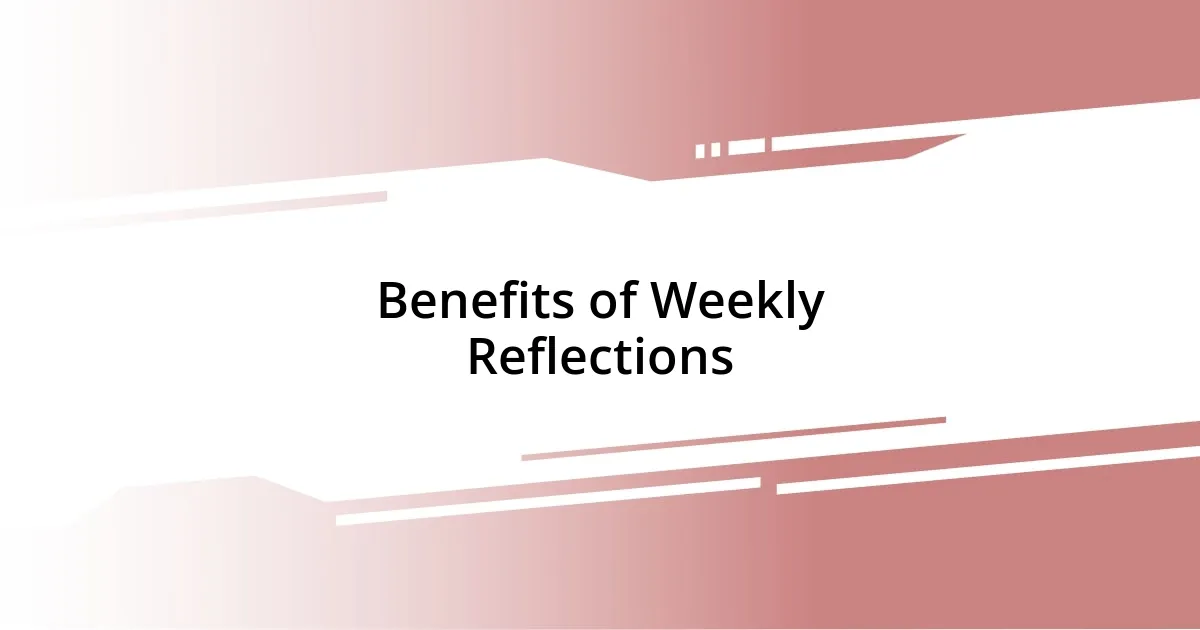
Benefits of Weekly Reflections
When I first started my routine of weekly reflections, I was surprised by how much clarity it brought. It’s incredible to see how this simple practice can enhance self-awareness. The act of revisiting my week allows me to connect the dots between my actions and feelings, helping me discern what truly matters. Have you ever felt the weight of uncertainty? Reflecting gives me confidence; it propels me forward with renewed clarity about what I want to pursue.
Another benefit I’ve found is that reflecting often leads to improved decision-making. There have been weeks when I questioned my choices, yet through reflection, I gained insights that illuminated the reasons behind them. It’s a like peeling layers of an onion – each layer revealing deeper truths about my motivations and challenges. I encourage you to tackle this practice with an open mind; the wisdom you find may surprise you.
Lastly, weekly reflections serve as a journal of gratitude. After jotting down my thoughts, I sometimes read back over previous reflections and smile. When I focus on the positives, it’s hard not to appreciate the little wins and moments of joy that I usually overlook. This gratitude practice creates a sense of abundance in my mind, fostering a more optimistic outlook throughout the week.
| Benefit | Description |
|---|---|
| Increased Self-Awareness | Helps to connect actions and feelings. |
| Improved Decision-Making | Offers insights that clarify motivations. |
| Gratitude Enhancement | Encourages appreciation for small victories. |
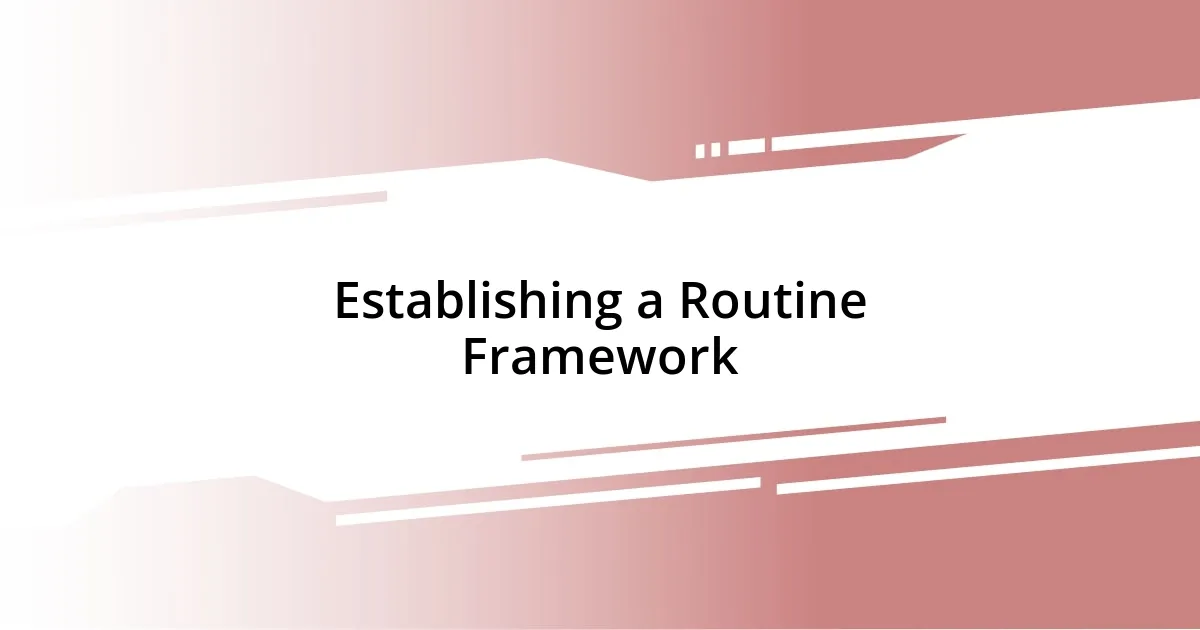
Establishing a Routine Framework
To establish a solid routine for weekly reflections, I find it helpful to create a consistent framework. This framework acts as a scaffold for my thoughts, allowing me to dive deeper without feeling overwhelmed. I usually carve out a specific time each week—often Sunday evenings—when the world is quieter and I can dedicate myself entirely to reflection. This intentionality transforms the act of reflecting into a cherished ritual rather than just a task on my to-do list.
Here are some elements that I incorporate into my routine framework:
- Time Block: Choose a regular time each week that works best for you.
- Environment: Find a comfortable, quiet space where you feel at ease.
- Journaling Tool: Use a specific notebook or digital app dedicated to reflections.
- Guiding Questions: Prepare a set of questions to help steer your thoughts.
- Follow-up: Make notes on intentions or goals for the upcoming week, creating continuity.
Finding what feels right for you is essential. I remember, in the early days of my reflections, I would often rush through it, but I quickly learned that pausing to create the right environment made a world of difference in the quality of my insights. It’s all about cultivating a space that resonates with your thoughts and feelings, paving the way for a more productive reflection session.
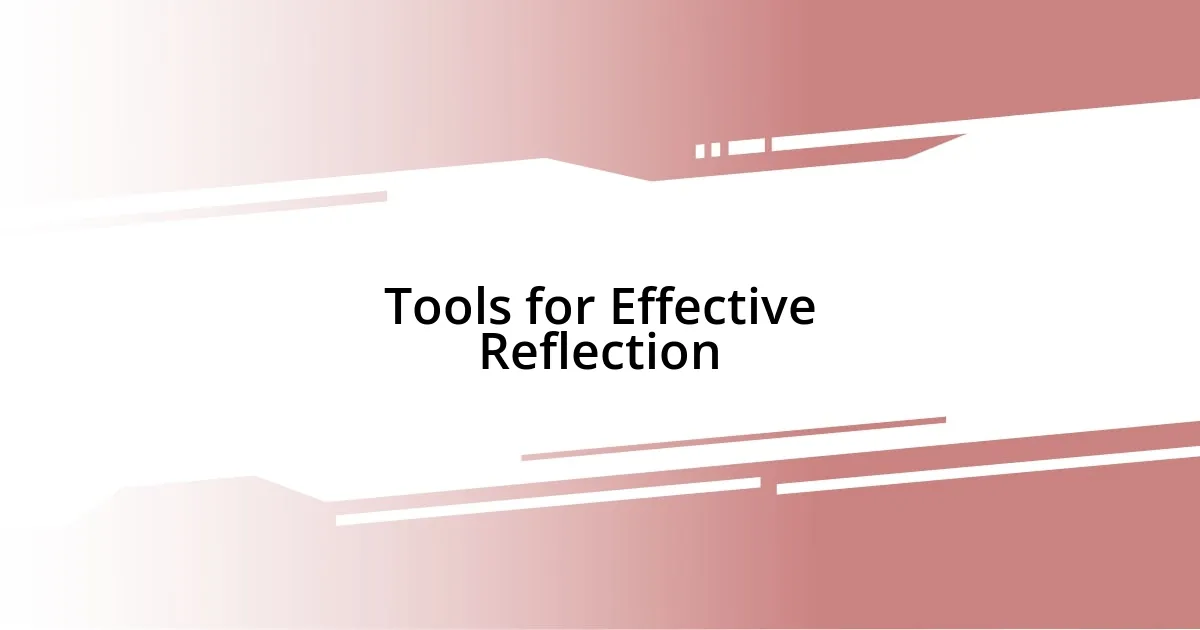
Tools for Effective Reflection
One of the most powerful tools I’ve discovered for effective reflection is a dedicated journal. When I first committed to writing my thoughts down, I assumed it would just be a chore. But over time, I found that each page became a canvas for my emotions and realizations. Have you ever flipped back to see how far you’ve come? It’s truly eye-opening, allowing me to track my growth and revisit the lessons learned along the way.
Another invaluable resource is the use of guiding questions. I often start my reflection sessions with prompts like, “What challenged me this week?” or “What brought me joy?” These questions help steer my thoughts and prevent me from venturing off into unrelated territory. I remember one week where I struggled with feelings of stress; asking myself specific questions helped me uncover the root causes, leading to effective coping strategies for the future.
Lastly, I wouldn’t underestimate the power of a quiet environment. I’ve established a cozy nook in my home, adorned with soft lighting and calming decor, that acts as my reflection sanctuary. The atmosphere shapes the quality of my insights significantly. Do you think your surroundings could impact your thoughts? For me, transforming my space into a peaceful retreat has made all the difference, allowing my mind to wander freely and openly during reflection.
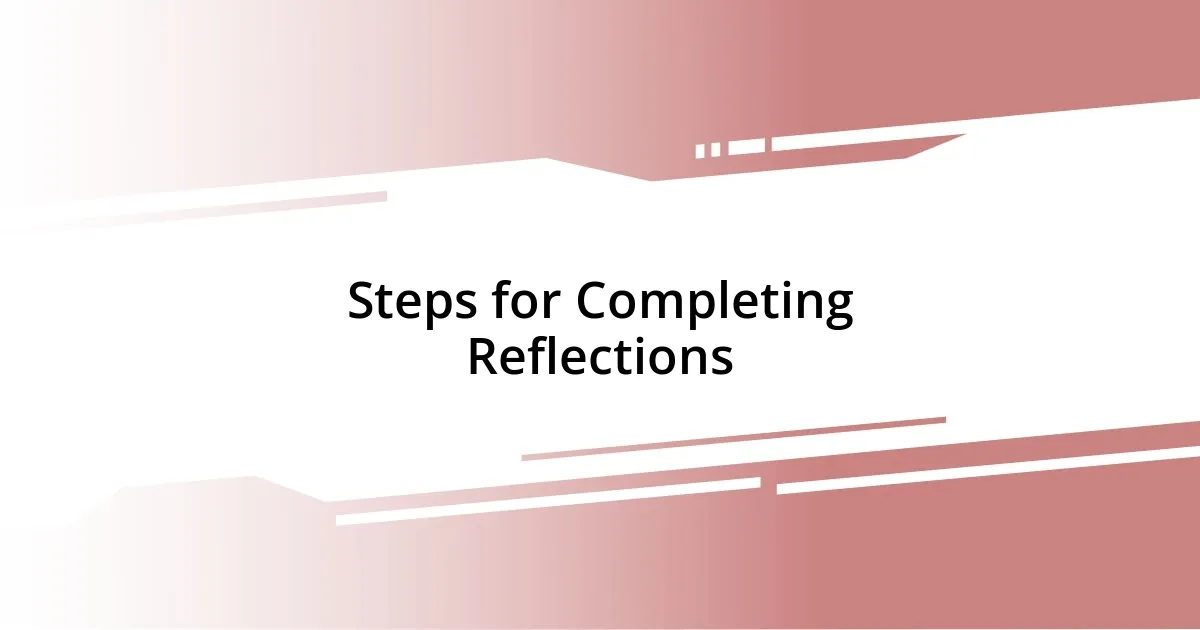
Steps for Completing Reflections
When I sit down to complete my reflections, the first step is mentally transitioning into my reflection space. I often find that lighting a candle or sipping my favorite herbal tea signals to my brain that it’s time to slow down and dive deep into my thoughts. Have you ever noticed how certain rituals can help shift your mindset? This small act creates a warm atmosphere, easing me into the reflective process.
Next comes the magic of jotting down guiding questions. I remember a particularly challenging week when I felt overwhelmed. Instead of steamrolling through my usual routine, I paused to craft questions like, “What did I learn from my struggles?” and “How can I celebrate my small wins?” These questions provided clarity. It’s almost like having a conversation with my inner self, helping me connect the dots on what truly mattered that week.
After my reflections are on paper, I always take a moment to summarize my key insights. I find that synthesizing my thoughts into a few takeaway points not only solidifies the lessons learned but also sets the stage for my intentions for the upcoming week. I often ask myself, “What action will I take based on these insights?” This reflection has transformed my experience; instead of just writing for the sake of writing, I now approach it with purpose, which genuinely enriches my personal growth journey.
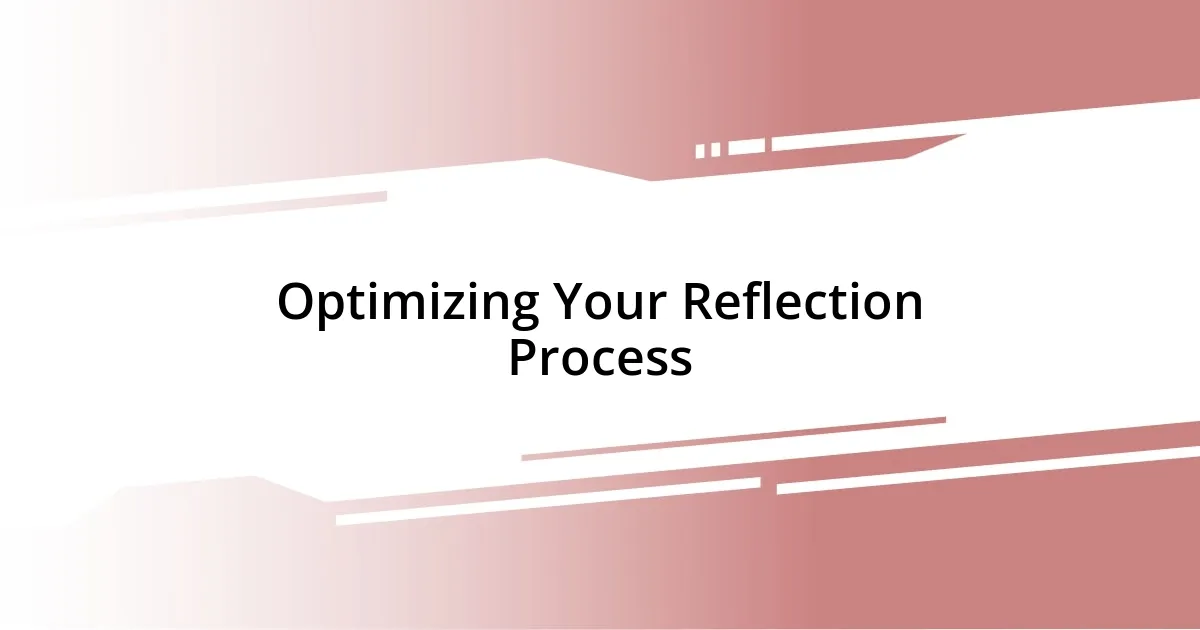
Optimizing Your Reflection Process
Optimizing your reflection process can be quite transformative. For instance, I’ve learned that timing plays a crucial role in deepening my insights. I often schedule my reflection sessions at the same time each week, like Sunday evenings. This rhythm creates a sense of anticipation, allowing me to mentally prepare throughout the week. Have you ever considered how a consistent schedule could enhance your reflective practice?
Another key factor I’ve discovered is the importance of diverse perspectives. Sometimes, I’ll share my reflections with a close friend or mentor, and their input can add layers to my understanding. It’s like holding a mirror to my thoughts; their questions often lead me to explore avenues I hadn’t considered. Have you tried discussing your reflections with someone else? You might be surprised at how much richer your insights can become.
Lastly, I found that integrating visual aids can add depth to my reflection process. One week, I created a mind map of my feelings, and the act of visually organizing my thoughts brought clarity I hadn’t expected. This method has now become a regular part of my approach. Isn’t it fascinating how different techniques can unlock parts of our minds? Embracing varied methods can make your reflection journey not just effective but also exciting.
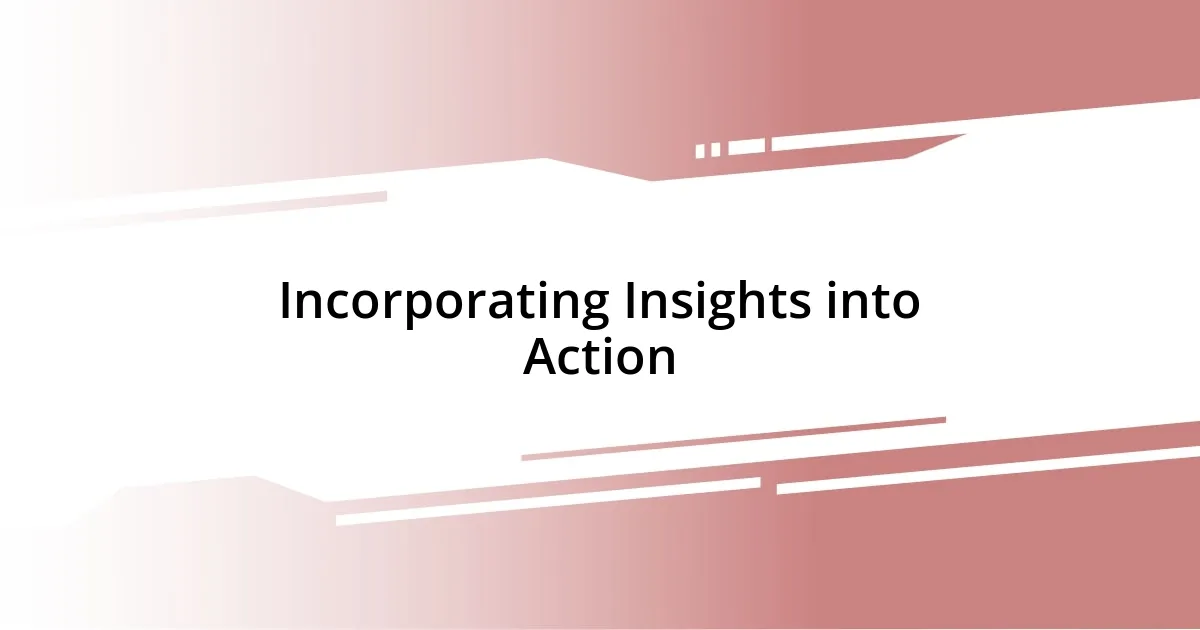
Incorporating Insights into Action
Incorporating my insights into actionable steps is where the real magic happens. I vividly remember a time when I uncovered a pattern of procrastination during my reflections. Instead of letting the realization fade away, I created a small weekly action plan, including specific tasks and deadlines. It felt empowering to transform that insight into something tangible, like a roadmap guiding me to overcome my inertia. Have you ever taken an insight and turned it into a plan? It really does bring a sense of control and direction.
One of my favorite techniques has been creating visual reminders of my insights. A few months ago, I crafted a vibrant vision board that captured my goals and the lessons I wanted to implement. Each time I pass by it, I’m reminded of my reflections, keeping me motivated and on track. It’s an excellent way to engage multiple senses while making those insights feel more integrated into daily life. Do you visualize your goals, or do you prefer to keep them in your mind? Either way, bringing them into the physical world can be powerful.
I also believe in the power of accountability partners. After realizing I had fallen short on a personal goal, I reached out to a friend who offered to check in weekly on my progress. Not only did it keep me committed, but the discussions we had would often spark new insights on what worked and what didn’t. Have you thought about having someone in your corner to encourage you? It makes the process feel less solitary and adds a layer of richness to the journey of turning reflections into actions.


